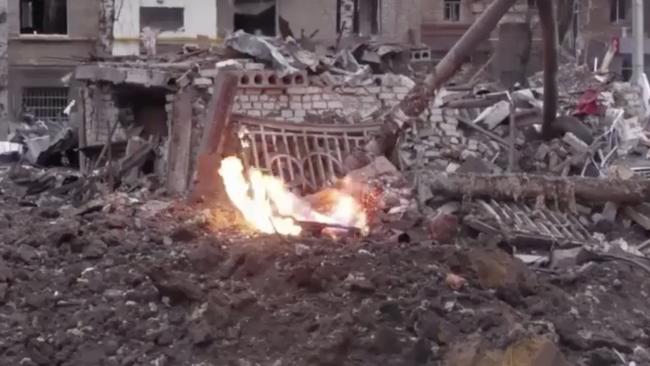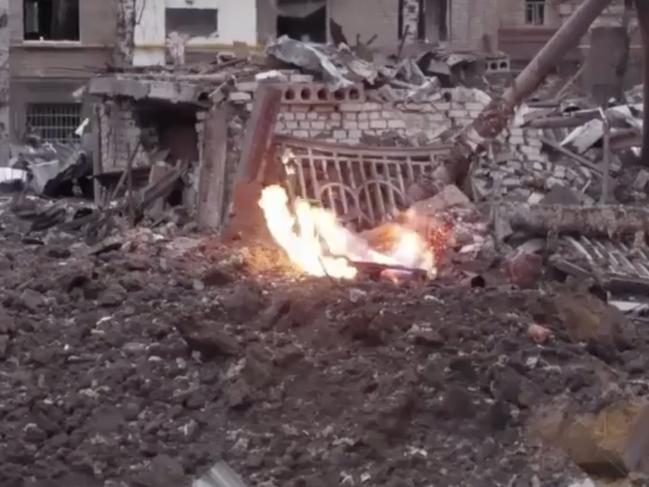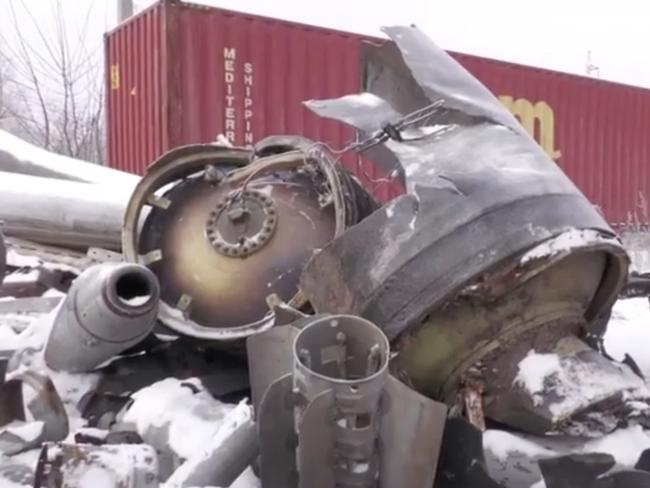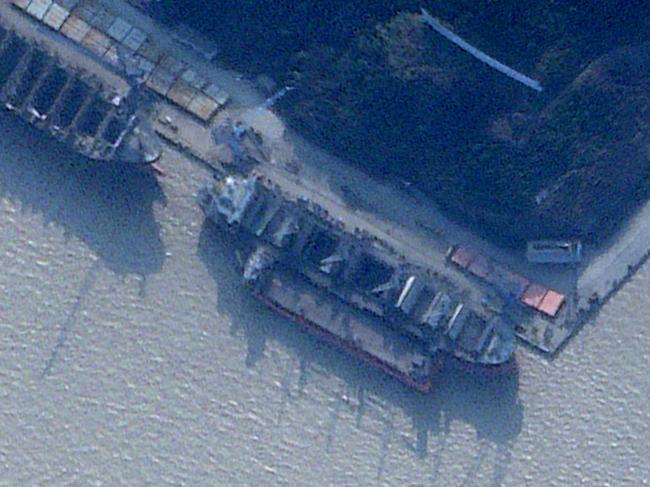UN reveals worrying find inside debris left from missile strike on Ukrainian city
UN officials have revealed the worrying discovery hidden in debris following a missile strike on a decimated Ukrainian city.

UN officials have declared that debris found around the Ukrainian city of Kharkiv showed remains of North Korean missiles that were likely provided to Russia to aid Vladimir Putin’s ongoing war effort.
In developments that have sent chills up geopolitical experts’ spines, North Korea’s Kim Jong-un has pledged to strengthen military relations with Russia as the European superpower persists in funnelling billions into its “special military campaign” that continues to destabilise the globe.
Western powers have now accused North Korea of transferring weapons to Russia, fearing they will ultimately be used against Ukrainian civilians.
Both Russia and North Korea have denied those accusations while simultaneously pledging to build on their existing relations as tensions continue to mount between major industrialised powers the world over.
Now, there appears to be evidence North Korea has been shipping over missiles.
The 32-page UN report said “debris recovered from a missile that landed in Kharkiv, Ukraine, on January 2 derives from a DPRK Hwasong-11 series missile”.
Three sanctions monitors had travelled to the bomb site this month and said they “could not independently identify from where the missile was launched, nor by whom”.
North Korea, which has been under UN sanctions for its ballistic missile and nuclear programs for almost 20 years, has now been warned it is in violation of the arms embargo put in place to curtail threats of escalation with neighbouring nations.
“Information on the trajectory provided by Ukrainian authorities indicates it was launched within the territory of the Russian Federation,” UN monitors wrote in a report to the security council’s North Korea sanctions committee.
“Such a location, if the missile was under control of Russian forces, would probably indicate procurement by nationals of the Russian Federation.”



The findings came weeks after Russia vetoed the United Nations’ renewal of a panel of experts monitoring North Korea’s compliance with the international sanctions in place.
“This is almost comparable to destroying a CCTV to avoid being caught red-handed,” South Korea’s UN ambassador Joonkook Hwang described, as the nation’s foreign ministry criticised Russia’s “irresponsible decision”.
Ukraine’s Foreign Minister Dmytro Kuleba meanwhile described the move as “a guilty plea”.

‘A worrisome prospect’
As the West fights through rampant economic instability and increased internal polarisation, there are fears a pact between Russia and North Korea could be the first steps in formation of a new axis.
Some analysts warn the chumminess between nuclear-armed, anti-West nations could eventually lead to a tipping point that sees multiple countries dragged into an unprecedented conflict.
While current leaders are well versed on the unspeakable reality of nuclear war, Mr Putin and Mr Kim have continued to flex their nuclear might and issue increasingly worrying threats.
Bruce Klingner, senior research fellow at the Heritage Foundation, said the strengthening of military ties between the two nations, who both share a disdain for Western sanctions, was “a worrisome prospect”.
“Moscow could provide financial, economic, or energy benefits,” he said.


“Some experts speculate that Russia might hand the crown jewels of cutting-edge military technology, such as designs for nuclear warheads, re-entry vehicles, or assistance on ICBMs.”
A Re-entry Vehicle is a spacecraft that travels through space and re-enters the atmosphere of a planet. An intercontinental ballistic missile (ICBM) is a ballistic missile with a range greater than 5,500km.
“However, it is more likely that Russia will provide second-tier weapon technology such as military reconnaissance satellites or advanced conventional weapon designs — still a worrisome prospect,” he added.
He said the reality of the alleged alliance has led to an “epiphany” the West sorely needed.
“Despite the deterioration in the Indo-Pacific security environment, there is also great cause for confidence,” he continued.
“The threatening actions of Russia, China, and North Korea led to an epiphany for the Indo-Pacific nations about the need for enhanced security measures and greater defence cooperation. To paraphrase Charles Dickens’s A Tale of Two Cities, it is the worst of times and the best of times for responding to these threats.”
More evidence of the strengthening relationship between Russia and China also emerged this month, with satellite images showing China was providing moorage for a US-sanctioned Russian cargo ship accused of facilitating North Korean arms transfers.
The images were supplied to Reuters via Planet Labs.

North Korea continues weapons tests
On Monday, Mr Kim oversaw the test-firing of a multiple rocket launcher despite facing ongoing accusations of providing Russia with an array weapons.
Analysts have said the nuclear-armed North could be testing and ramping up production of artillery and cruise missiles before sending them to Russia for use in Ukraine.
The “flight features, (and) hit and concentration indices” of the “240mm shell of a multiple rocket launcher”, made at Pyongyang’s new defence industry unit, were “evaluated very satisfactorily” during the test, according to the official Korean Central News Agency.
Mr Kim has stressed “the need... to surely carry out the munitions production plan for this year in a qualitative way”.
The rocket launcher “with new technology would bring about a strategic change in bolstering up the artillery force” of the North’s army, Mr Kim said.

Earlier this week, Pyongyang said Mr Kim had overseen the country’s first ever “nuclear trigger” drills, which involved simulating a nuclear counter-attack as a warning to enemies.
Yang Moo-jin, president of the University of North Korean Studies in Seoul, said based on the Friday announcement, the North seems to have achieved “some progress” in integrating guidance technology for precision strikes targeting South Korea’s capital region.
“The entire country resembles a missile defense industry expo,” he told AFP.
Last year, North Korea conducted a record number of missile tests in defiance of UN sanctions in place since 2006 and despite warnings from Washington and Seoul.
Pyongyang declared itself an “irreversible” nuclear weapons state in 2022.
North Korea has since declared South Korea its “principal enemy” and has threatened war over “even 0.001 mm” of territorial infringement.
Originally published as UN reveals worrying find inside debris left from missile strike on Ukrainian city





